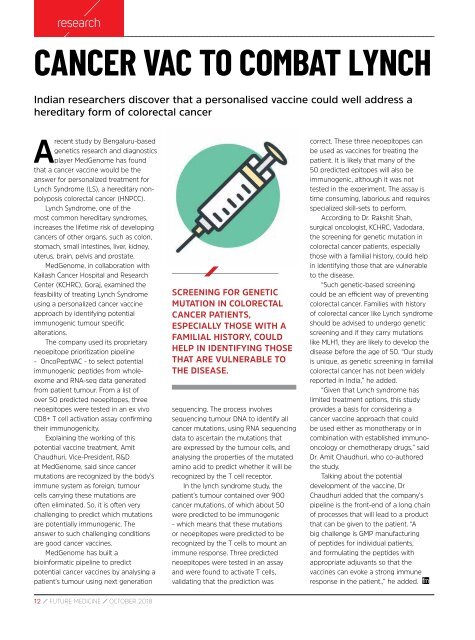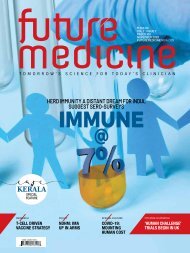Create successful ePaper yourself
Turn your PDF publications into a flip-book with our unique Google optimized e-Paper software.
esearch<br />
CANCER VAC TO COMBAT LYNCH<br />
Indian researchers discover that a personalised vaccine could well address a<br />
hereditary form of colorectal cancer<br />
A<br />
recent study by Bengaluru-based<br />
genetics research and diagnostics<br />
player MedGenome has found<br />
that a cancer vaccine would be the<br />
answer for personalized treatment for<br />
Lynch Syndrome (LS), a hereditary nonpolyposis<br />
colorectal cancer (HNPCC).<br />
Lynch Syndrome, one of the<br />
most common hereditary syndromes,<br />
increases the lifetime risk of developing<br />
cancers of other organs, such as colon,<br />
stomach, small intestines, liver, kidney,<br />
uterus, brain, pelvis and prostate.<br />
MedGenome, in collaboration with<br />
Kailash Cancer Hospital and Research<br />
Center (KCHRC), Goraj, examined the<br />
feasibility of treating Lynch Syndrome<br />
using a personalized cancer vaccine<br />
approach by identifying potential<br />
immunogenic tumour specific<br />
alterations.<br />
The company used its proprietary<br />
neoepitope prioritization pipeline<br />
- OncoPeptVAC - to select potential<br />
immunogenic peptides from wholeexome<br />
and RNA-seq data generated<br />
from patient tumour. From a list of<br />
over 50 predicted neoepitopes, three<br />
neoepitopes were tested in an ex vivo<br />
CD8+ T cell activation assay confirming<br />
their immunogenicity.<br />
Explaining the working of this<br />
potential vaccine treatment, Amit<br />
Chaudhuri, Vice-President, R&D<br />
at MedGenome, said since cancer<br />
mutations are recognized by the body’s<br />
immune system as foreign, tumour<br />
cells carrying these mutations are<br />
often eliminated. So, it is often very<br />
challenging to predict which mutations<br />
are potentially immunogenic. The<br />
answer to such challenging conditions<br />
are good cancer vaccines.<br />
MedGenome has built a<br />
bioinformatic pipeline to predict<br />
potential cancer vaccines by analysing a<br />
patient’s tumour using next generation<br />
SCREENING FOR GENETIC<br />
MUTATION IN COLORECTAL<br />
CANCER PATIENTS,<br />
ESPECIALLY THOSE WITH A<br />
FAMILIAL HISTORY, COULD<br />
HELP IN IDENTIFYING THOSE<br />
THAT ARE VULNERABLE TO<br />
THE DISEASE.<br />
sequencing. The process involves<br />
sequencing tumour DNA to identify all<br />
cancer mutations, using RNA sequencing<br />
data to ascertain the mutations that<br />
are expressed by the tumour cells, and<br />
analysing the properties of the mutated<br />
amino acid to predict whether it will be<br />
recognized by the T cell receptor.<br />
In the lynch syndrome study, the<br />
patient’s tumour contained over 900<br />
cancer mutations, of which about 50<br />
were predicted to be immunogenic<br />
- which means that these mutations<br />
or neoepitopes were predicted to be<br />
recognized by the T cells to mount an<br />
immune response. Three predicted<br />
neoepitopes were tested in an assay<br />
and were found to activate T cells,<br />
validating that the prediction was<br />
correct. These three neoepitopes can<br />
be used as vaccines for treating the<br />
patient. It is likely that many of the<br />
50 predicted epitopes will also be<br />
immunogenic, although it was not<br />
tested in the experiment. The assay is<br />
time consuming, laborious and requires<br />
specialized skill-sets to perform.<br />
According to Dr. Rakshit Shah,<br />
surgical oncologist, KCHRC, Vadodara,<br />
the screening for genetic mutation in<br />
colorectal cancer patients, especially<br />
those with a familial history, could help<br />
in identifying those that are vulnerable<br />
to the disease.<br />
“Such genetic-based screening<br />
could be an efficient way of preventing<br />
colorectal cancer. Families with history<br />
of colorectal cancer like Lynch syndrome<br />
should be advised to undergo genetic<br />
screening and if they carry mutations<br />
like MLH1, they are likely to develop the<br />
disease before the age of 50. “Our study<br />
is unique, as genetic screening in familial<br />
colorectal cancer has not been widely<br />
reported in India,” he added.<br />
“Given that Lynch syndrome has<br />
limited treatment options, this study<br />
provides a basis for considering a<br />
cancer vaccine approach that could<br />
be used either as monotherapy or in<br />
combination with established immunooncology<br />
or chemotherapy drugs,” said<br />
Dr. Amit Chaudhuri, who co-authored<br />
the study.<br />
Talking about the potential<br />
development of the vaccine, Dr<br />
Chaudhuri added that the company’s<br />
pipeline is the front-end of a long chain<br />
of processes that will lead to a product<br />
that can be given to the patient. “A<br />
big challenge is GMP manufacturing<br />
of peptides for individual patients,<br />
and formulating the peptides with<br />
appropriate adjuvants so that the<br />
vaccines can evoke a strong immune<br />
response in the patient.,” he added.<br />
12 / FUTURE MEDICINE / <strong>OCTOBER</strong> <strong>2018</strong>


















